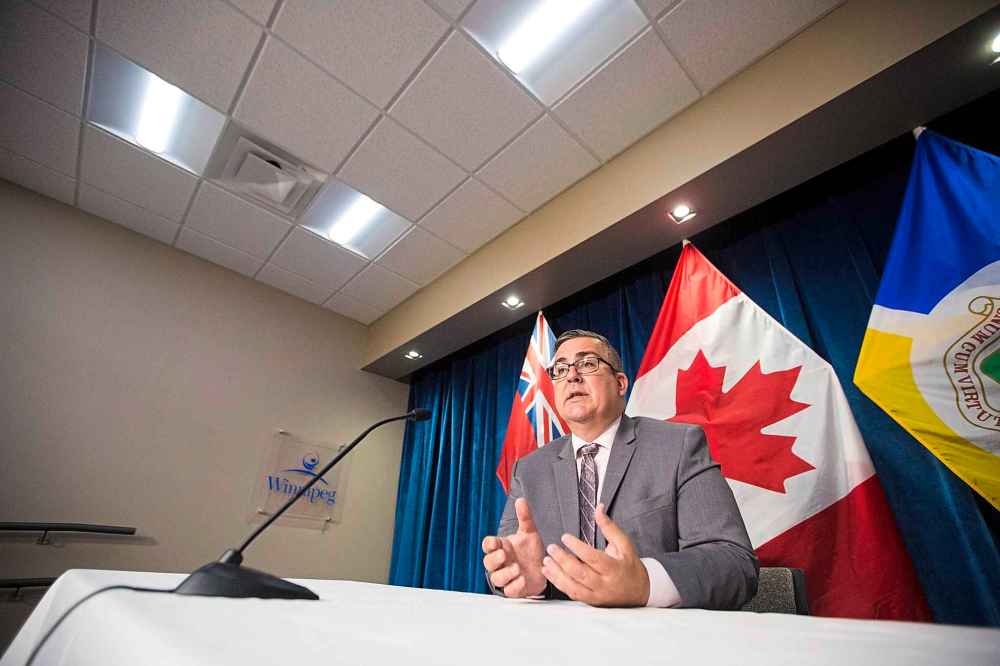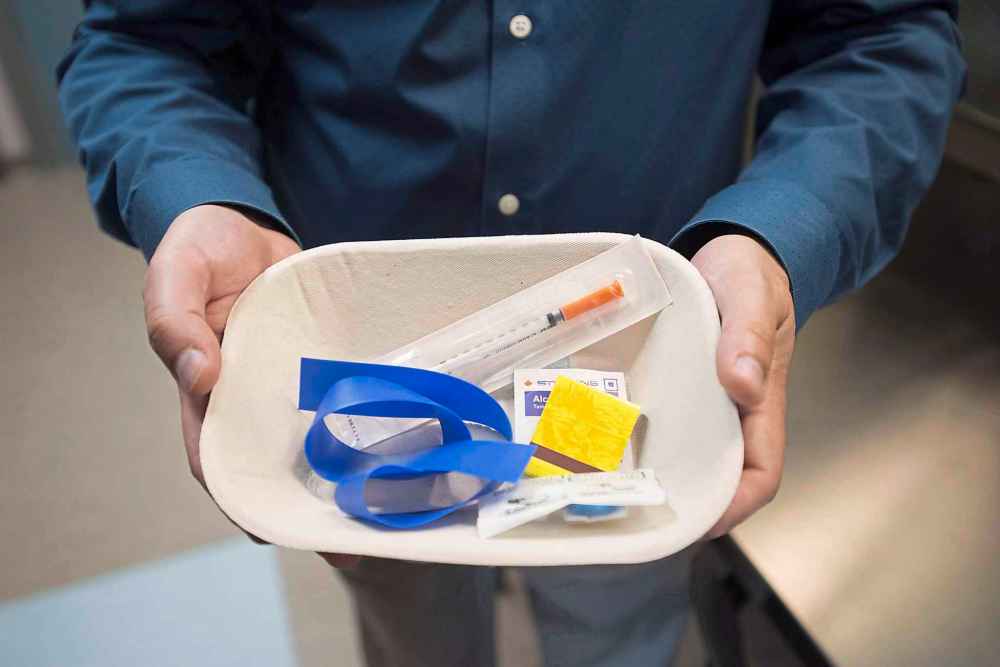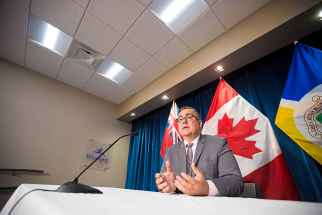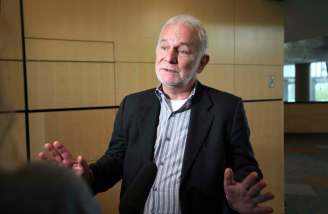Meth task force report ‘passing the baton to each of the three levels of government’
Read this article for free:
or
Already have an account? Log in here »
To continue reading, please subscribe:
Monthly Digital Subscription
$0 for the first 4 weeks*
- Enjoy unlimited reading on winnipegfreepress.com
- Read the E-Edition, our digital replica newspaper
- Access News Break, our award-winning app
- Play interactive puzzles
*No charge for 4 weeks then price increases to the regular rate of $19.00 plus GST every four weeks. Offer available to new and qualified returning subscribers only. Cancel any time.
Monthly Digital Subscription
$4.75/week*
- Enjoy unlimited reading on winnipegfreepress.com
- Read the E-Edition, our digital replica newspaper
- Access News Break, our award-winning app
- Play interactive puzzles
*Billed as $19 plus GST every four weeks. Cancel any time.
To continue reading, please subscribe:
Add Free Press access to your Brandon Sun subscription for only an additional
$1 for the first 4 weeks*
*Your next subscription payment will increase by $1.00 and you will be charged $16.99 plus GST for four weeks. After four weeks, your payment will increase to $23.99 plus GST every four weeks.
Read unlimited articles for free today:
or
Already have an account? Log in here »
Hey there, time traveller!
This article was published 28/06/2019 (2358 days ago), so information in it may no longer be current.
Landlords, business owners and politicians can all help solve Winnipeg’s methamphetamine crisis, according to a multi-level report that calls for a rethink of Manitoba’s courts, hospitals and social services.
Known as the Illicit Drug Task Force, the group released a 45-page report Friday, identifying a dozen areas for all three levels of government to expand and co-ordinate services and funding.
However, the report drew criticism from Winnipeg Mayor Brian Bowman and Liberal MP Robert-Falcon Ouellette, who said the document fell short on offering quick solutions.

“There are simply not enough specific, short-term actions outlined to implement immediately,” Bowman told reporters. The mayor said he’d present his executive policy committee with his own list of eight or more short-term actions on Tuesday.
“We need to be focusing less on studying and talking, and we need to be spending a lot more time acting.”
What they had to say
“It’s not just about meth. It’s about choices being made that lead to addictions of various kinds.”
— Manitoba Premier Brian Pallister
“The urgency needs to be felt and acted upon by every single level of government, including the municipal government… We shouldn’t be waiting for election cycles to come and go before additional, substantive, tangible actions occur in our community.”
— Winnipeg Mayor Brian Bowman
“It’s not just about meth. It’s about choices being made that lead to addictions of various kinds.”
— Manitoba Premier Brian Pallister
“The urgency needs to be felt and acted upon by every single level of government, including the municipal government… We shouldn’t be waiting for election cycles to come and go before additional, substantive, tangible actions occur in our community.”
— Winnipeg Mayor Brian Bowman
“The work of this task force is cheapened by having a provincial government that’s unwilling to support a safe consumption site. We need a full-throated, 100 per cent-forward approach to attacking the meth crisis.”
— Manitoba NDP Leader Wab Kinew
“The Pallister government expects the private sector to pick up the slack on what is a public-health and justice crisis. This is a job for government, but Brian Pallister is shirking his responsibility.”
— Manitoba Liberal Leader Dougald Lamont
“Is there more to do? Clearly there is — will this report help us go in the right direction? Yes, it is a framework for action, the first of its kind, that will undoubtedly help us identify, zero-in on opportunities, and make those investments.”
— Manitoba Health Minister Cameron Friesen
“I don’t think this should have taken six months. If anybody would have the time to use the people who have the lived experience with this kind of thing, we could be six months ahead of where we are now.”
— Kim Longhurst, Brandon woman whose son has struggled with meth abuse
“When you bring people from diverse ideological positions into a room for three months every two weeks, it’s remarkable when you can come up with some common recommendations… I’m not going to tell you that everybody was all kumbaya. There was lots of debate at the table.”
— Rick Lees, head of Main Street Project
“We weren’t able to have a really robust conversation about opioids, nor were we able to come up with comprehensive action plans for rural and remote areas. This tight-timelined meeting format is not the optimal way to comprehensively plan for our province on such important issues”
— Kelly Holmes, head of Resource Assistance for Youth
“We had a lot of people who don’t come from government and who are expecting governments to do something. That’s going to be a useful vehicle, at least as a periodic check-in, to try to make sure everyone remains on track.”
— Michael Jack, chief corporate services officer, City of Winnipeg
The tri-level task force was established in December, following a unanimous motion from Winnipeg city council in response to the meth crisis, which has overtaken opioids and overwhelmed first responders and health-care providers.
The report does not list separate tasks for Ottawa, the province of Manitoba, and the city.
Michael Jack, City of Winnipeg chief corporate services officer, co-chaired the task force. He called the report a roadmap for the governments, saying it’s up to each to determine how and when they can best respond.
“We were trying to be as prescriptive as we could, but still make some strong recommendations,” Jack said. “We are passing the baton to each of the three levels of government.”
The report touches on numerous sectors of society:
Supervised injection sites
There was a clear divide on this issue before the task force was established, with the Pallister government opposed to the concept, and Bowman and Prime Minister Justin Trudeau in strongly in favour.
The report calls these sites a “component of a harm-reduction strategy” and a pathway to treatment, but doesn’t actually recommend creating them.
Rick Lees, executive director of Main Street Project and a member of the task force, said there was only disagreement over how, when and where such sites should be established.

“There was agreement for it — how to do it would be what we didn’t have time to hammer out,” he said.
“Safe consumption is part of a larger continuum that you need to have in place. You shouldn’t recommend something until you are sure that you have the full continuum in place, which is a good harm-reduction strategy.”
Manitoba Health Minister Cameron Friesen said he was “very skeptical” of the idea.
“There is no injection site that was ever built for the administration of methamphetamines; I don’t even understand what that purpose would be,” he said.
Needle distribution, recovery
Another harm-reduction measure the report looks at is providing sterile needles to illicit-drug users. It argues needle returns have saved suffering and public costs by preventing the spread of blood‐borne pathogens.
It notes Winnipeg residents are finding more discarded needles in parks and green spaces, making downtown and suburban residents feeling unsafe and fostering negative attitudes towards illicit-drug users.
The report recommends regional health authorities distribute sterilization equipment, syringes, gauze and disposal equipment.
Expansion of drug-treatment courts, housing supports
The task force singled out the Winnipeg Drug Treatment Court for its ability to “break the cycle” of drug use, criminal behaviour and incarceration for non-violent offenders. It urged the WDTC be expanded and replicated in other communities.
The report notes WDTC graduates reoffend far less than those sentenced by traditional courts, and argues far more people qualify for the program than its funding allows.
However, many participants are homeless or living in environments some might lead some to reoffend. The report says stable, sober housing arrangements would hep even fewer WDTC graduates reoffend.
Detainment, 24-hour safe spaces
The report calls on a review of the Intoxicated Persons Detention Act, to see whether police should be able to detain meth users for longer than the current 24 hours when they pose a risk to themselves or others.
The report notes while several Winnipeg agencies offer shelters for the homeless and illicit-drug users, those groups lack enough funding to operate on a round-the-clock basis.

A safe space “allows individuals to build a sense of connection and belonging within their community, reduces the social isolation they experience, and is a vital link in referring them to appropriate resources and programming,” the report notes, arguing for more funding.
Otherwise, meth users end up taking up spots in emergency rooms or jails, instead of getting appropriate help.
Long-term treatment facilities
The report notes Manitoba lacks a “co-ordinated continuum of care,” with programs subject to funding and criteria set out by multiple provincial and federal government departments, as well as privately funded services.
Better co-ordination is the No. 1 takeaway for Brandon mother Kim Longstreet, whose son circled in and out of various treatment programs for a decade.
“That there is the method, the structure, that will define whether or not anything that is done will be successful,” she said Friday. Otherwise, “we’re almost trying to set people up for failure.”
Longstreet says too many Manitobans get out of detox only to be told to wait weeks for treatment, and end up relapsing.
The report notes treatment programs lasting longer than a month tend to have better success rates, especially for meth addictions, which involve a high chance of relapse and a longer time to restore life skills.
Jobs, recreation for at-risk communities
The report strongly urges funding and programming be directed to recreation programming and employment in at-risk communities.
“A way to increase opportunities for youth in susceptible populations is to engage them in positive organized, structured, group-based programs and initiatives such as sports clubs, leagues and other culturally appropriate activities,” the report states.
The report says culturally appropriate programming is needed anywhere from downtown to rural and northern areas, too.
“The lack of recreation opportunities in under-served communities results in children and youth not having access to positive groups of peers and leaders. The lack of connection to a positive organized leadership can be isolating and make children and youth vulnerable to negative influences.”
The report also urges governments to work with businesses to create job opportunities for recovering addicts, noting unemployed, disadvantaged youth feel alienated.
It also calls on better training for landlords of their right and responsibilities, to cut down on meth houses.
— with files from Larry Kusch
dylan.robertson@freepress.mb.ca
aldo.santin@freepress.mb.ca
History
Updated on Friday, June 28, 2019 9:49 AM CDT: Adds missing word
Updated on Friday, June 28, 2019 7:44 PM CDT: Adds quote











